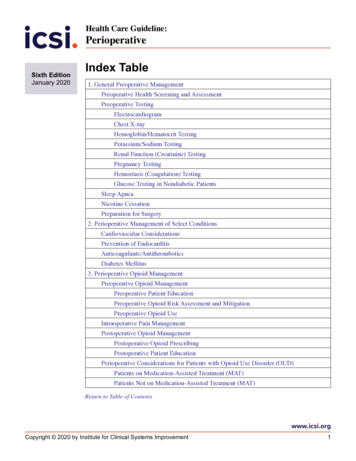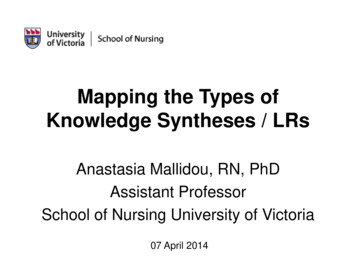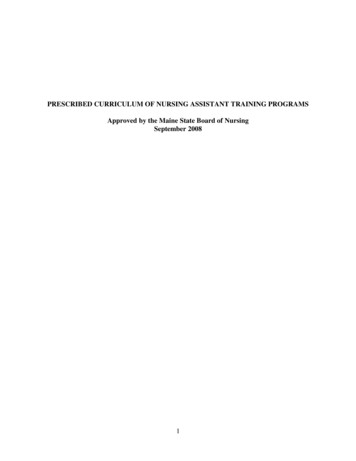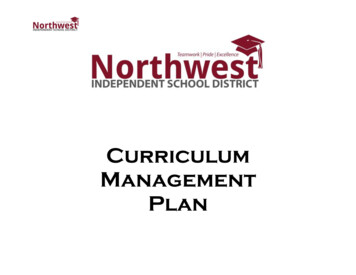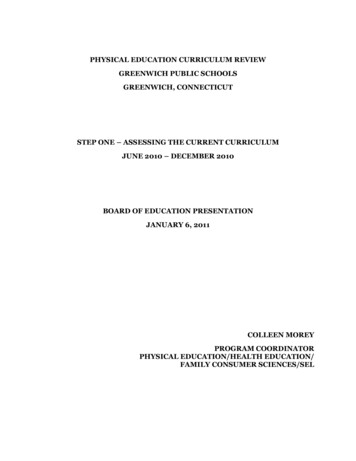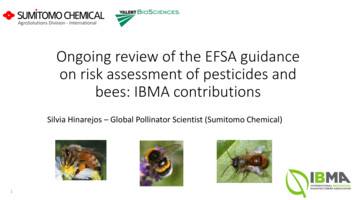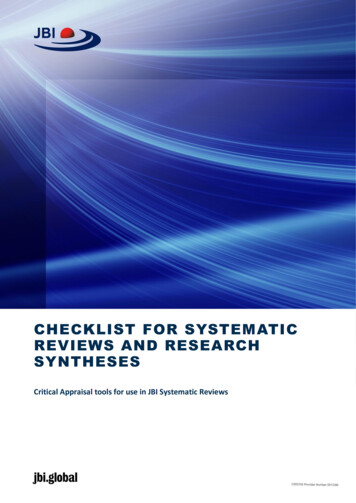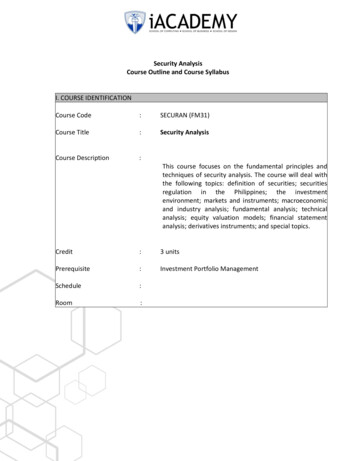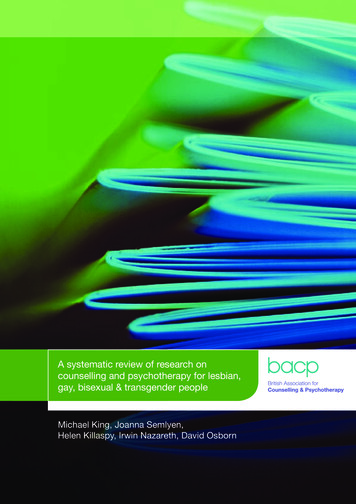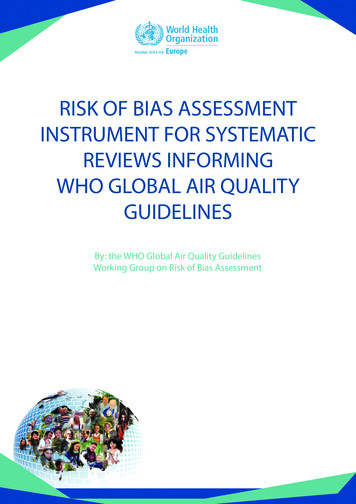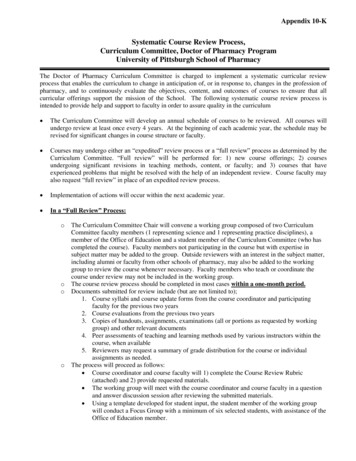
Transcription
Appendix 10-KSystematic Course Review Process,Curriculum Committee, Doctor of Pharmacy ProgramUniversity of Pittsburgh School of PharmacyThe Doctor of Pharmacy Curriculum Committee is charged to implement a systematic curricular reviewprocess that enables the curriculum to change in anticipation of, or in response to, changes in the profession ofpharmacy, and to continuously evaluate the objectives, content, and outcomes of courses to ensure that allcurricular offerings support the mission of the School. The following systematic course review process isintended to provide help and support to faculty in order to assure quality in the curriculum The Curriculum Committee will develop an annual schedule of courses to be reviewed. All courses willundergo review at least once every 4 years. At the beginning of each academic year, the schedule may berevised for significant changes in course structure or faculty. Courses may undergo either an “expedited” review process or a “full review” process as determined by theCurriculum Committee. “Full review” will be performed for: 1) new course offerings; 2) coursesundergoing significant revisions in teaching methods, content, or faculty; and 3) courses that haveexperienced problems that might be resolved with the help of an independent review. Course faculty mayalso request “full review” in place of an expedited review process. Implementation of actions will occur within the next academic year. In a “Full Review” Process:ooooThe Curriculum Committee Chair will convene a working group composed of two CurriculumCommittee faculty members (1 representing science and 1 representing practice disciplines), amember of the Office of Education and a student member of the Curriculum Committee (who hascompleted the course). Faculty members not participating in the course but with expertise insubject matter may be added to the group. Outside reviewers with an interest in the subject matter,including alumni or faculty from other schools of pharmacy, may also be added to the workinggroup to review the course whenever necessary. Faculty members who teach or coordinate thecourse under review may not be included in the working group.The course review process should be completed in most cases within a one-month period.Documents submitted for review include (but are not limited to);1. Course syllabi and course update forms from the course coordinator and participatingfaculty for the previous two years2. Course evaluations from the previous two years3. Copies of handouts, assignments, examinations (all or portions as requested by workinggroup) and other relevant documents4. Peer assessments of teaching and learning methods used by various instructors within thecourse, when available5. Reviewers may request a summary of grade distribution for the course or individualassignments as needed.The process will proceed as follows: Course coordinator and course faculty will 1) complete the Course Review Rubric(attached) and 2) provide requested materials. The working group will meet with the course coordinator and course faculty in a questionand answer discussion session after reviewing the submitted materials. Using a template developed for student input, the student member of the working groupwill conduct a Focus Group with a minimum of six selected students, with assistance of theOffice of Education member.
After review of all relevant information, the working group will prepare a summary andsuggestions for any needed actions.The summary will be reviewed with the course coordinator and the Chair of theCurriculum Committee. Subsequently, the working groups will present its findings andrecommendations to the Curriculum Committee for discussion and action.In an “Expedited Review” Process:o Documents submitted for review include (but are not limited to);1. Course syllabi and course update forms for the previous two years2. Course evaluations from the previous two years3. Copies of handouts, assignments, examinations (all or portions as requested by workinggroup) and other relevant documents4. Peer assessments of teaching and learning methods used by various instructors within thecourse, when availableoThe process will proceed as follows Course faculty will complete the Course Review Rubric (attached) as a self-evaluation forreflection and perspective and provide requested materials. One faculty member of the Curriculum Committee will review materials, meet with coursefaculty, complete the evaluation rubric and prepare a summary and suggestions for any neededactions. The summary will be reviewed with the course coordinator and the Chair of theCurriculum Committee and presented to the Curriculum Committee for discussion and action.SUGGESTED TIMELINE FOR EVALUATIONJuly1. Curriculum Committee Chair will notify Department Chairs of courses to undergo course reviews for theupcoming academic year.2. Curriculum Committee Chair will notify course coordinators of courses to undergo course reviews for theupcoming academic year.Immediately following completion of class1. Curriculum Committee Chair will request documents and materials for course review from course coordinators.2. Curriculum Committee Chair will convene working group for course review.One month following completion of class1. Course coordinator will submit course review rubric, documents and materials to Curriculum Committee Chair.2. Appointed working group will begin course review process.May (for Fall term courses) or September (for Spring term courses)1. Curriculum Committee working group will meet with course coordinator and faculty to discuss the results ofthe course review.2. Working group will prepare final report of course review to present to Curriculum Committee.June (for Fall term courses) or October (for Spring term courses)1. Final report of the course review will be presented to the Curriculum Committee.2. Curriculum Committee will provide additional feedback and approval of the course review and proposedchanges.Approved: July 2007Revised May 2008; Jan 20092
EVALUATION CYCLE (Course Reviews to be concluded by June for Fall Courses, by October for Spring Courses)2007 – 2008Pharm 5215 & 5216 – Infectious Disease 1 & 2 (9/07)Pharm 5321 – Advanced Pharmaceutical Care 2 (10/07)Pharm 5319 – Neurology-Psychiatry (10/07)Pharm 5116 & 5117 – Biochemistry 1 & 2 (5/08)2008 – 2009Pharm 5110 & 5111 – Professions of Pharmacy 1 & 2Pharm 5112 & 5113 – Experiential Learning 1 & 2Pharm 5219 – Drug Development 3Pharm 5315 – Oncology ModulePharm 5314 – ImmunologyPharm 5810 – APhA Immunization Certificate ProgramPharm 5813 – Acute Care Pharmacotherapy SimulationPharm 5801 – Pharmaceutical Care to Underserved PopulationsPharm 5814 – Global Health: Determinants and Application2009 – 2010Pharm 5210 & 5211 – Professions of Pharmacy 3 & 4Pharm 5212 & 5213 – Experiential Learning 3 & 4Pharm 5310 & 5311 – Professions of Pharmacy 5 & 6Pharm 5312 & 5313 – Experiential Learning 5 & 6Pharm 5806 – Pediatric Pharmaceutical CarePharm 5805 – Community Pharmacy ManagementPharm 5900 - 5903 – Pharmacy Administration elective seriesPharm 2510 & 2511 – Executive Boardroom SeriesPharm 5815 – Concepts of Managed Care2010 – 2011Pharm 5114 & 5115 – Anatomy & Physiology 1 & 2Pharm 5118 – Principles of Drug ActionPharm 5119 – Drug Development 1Pharm 5218 – Drug Development 2Pharm 5216 – Pharmacology of Cardiovascular DiseasePharm 5225 – Advanced Pharmaceutical Care 1Pharm 5400 – PharmD SeminarPharm 5809 – Principles and Techniques for Teaching2011 – 2012Pharm 5116 & 5117 – Biochemistry 1 & 2Pharm 5215 & 5216 – Infectious Disease 1 & 2Pharm 5223 – Gactroenterology / NutritionPharm 5316 – Pulmonology / RhematologyPharm 5318 – EndocrinologyPharm 5321 – Advanced Pharmaceutical Care 2Pharm 5319 – Neurology-PsychiatryPharm 5808 – Comprehensive Diabetes ManagementPharm 5811 – Clinical NutritionApproved: July 2007Revised May 2008; Jan 20093
Template of Questions for Working Group Course ReviewI.Curriculum Implications and Current Status How does the course fit into the overall curriculum (e.g., curricular outcomes)? What curricular orprogrammatic needs is the course intended to meet? What prerequisite skills, experiences or courses are needed in order to succeed in the course? Describe course changes in the past 2 years. What led to these changes and how have thesechanges affected student learning? Have any specific issues been associated with the course and, if so, how have they been resolved?II.Learning Objectives What are the formal, stated objectives of the course? How do these relate to curriculum outcomesand competencies students will need in their careers? What other purposes or goals do the faculty, administrators, and other interested audiences have forthe course?III.Content How are the various content elements related to the course objectives? Which objectives receive the most coverage or emphasis? Why? Which objectives receive minor coverage? Why? Is the content sequenced or arranged? What is the rationale for the content sequence? To what extent does fragmentation or lack of coherence appear to be a problem? What information/content is duplicative to other courses taken before or after this course? Is theduplication warranted? Why?IV.Instructional Strategies What types of learning activities are used? What is the rationale for selection of these activities inlight of the course objectives and curriculum outcomes? Would additional types of activities enhance student learning? What instructional materials are used? How effectively?V.Evaluating Student Achievement What instruments and procedures are used to collect evidence of student progress andachievement? How well do the assessment procedures correspond to the course content and objectives? Whichobjectives or content areas are not assessed? Why? How are the assessment results used? Are the results shared with the students within a reasonableamount of time? How consistently are the assessment criteria applied from instructor to instructor and from term toterm? Is the amount of assessment excessive, about right, or insufficient? How have course evaluation suggestions and information been used to improve the course in thepast 2 years?VI.Organization Do faculty meet to discuss flow of material, overlap and common themes? How well is the student workload distributed throughout the course? Are the necessary facilities, equipment, and materials readily available and in good workingcondition when needed?Outcomes At the end of the course, what evidence is there that students have achieved the stated objectives? What objectives does the course help students meet the most? The least?VII.Approved: July 2007Revised May 2008; Jan 20094
Template of Questions for Student Focus Group Course ReviewI.Curriculum Implications and Current Status Have any specific issues been associated with the course and, if so, how have they been resolved?II.Learning Objectives What goals and expectations do students have for the course? To what extent are these additionalgoals and expectations compatible with the stated course objectives?III.Content Which objectives receive the most coverage or emphasis? Why? Which objectives receive minor coverage? Why? To what extent does fragmentation or lack of coherence appear to be a problem? What information/content is duplicative to other courses taken before or after this course? Is theduplication warranted? Why?IV.Instructional Strategies Would additional types of activities enhance student learning? What instructional materials are used? How effectively?V.Evaluating Student Achievement How are the assessment results used? Are the results shared with the students within a reasonableamount of time? How consistently are the assessment criteria applied from instructor to instructor and from term toterm? Is the amount of assessment excessive, about right, or insufficient?VI.Organization How well is the student workload distributed throughout the course? Are the necessary facilities, equipment, and materials readily available and in good workingcondition when needed?VII.Outcomes At the end of the course, what evidence is there that students have achieved the stated objectives? What objectives does the course help students meet the most? The least?Approved: July 2007Revised May 2008; Jan 20095
University of Pittsburgh School of PharmacyCourse ReviewUse this rubric to evaluate the course and assist the instructor in improving the quality of instruction and learning.Course:Reviewers:Date completed:Course SyllabusMeets ExpectationsNeeds ImprovementDoes Not Meet ExpectationsThe course syllabus follows theguidelines established by theCurriculum Committee including: acomplete listing of faculty who teachin the course, course objectives, aclass schedule, assessmentmethods, estimated student timebudget, statement on disability, andacademic integrity.In general, the syllabus follows theguidelines established by theCurriculum Committee but someminor revisions are needed.The course syllabus does notfollow the guidelines establishedby the Curriculum Committee. Thesyllabus format needs to berevised significantly in order tomeet the guidelines.Reviewer: list missing sectionsbelowCoordinatorassessmentMeetsNeeds ImprovementDoes Not Meet ExpectationsReviewers’assessmentMeetsNeeds ImprovementDoes Not Meet ExpectationsRelation of CourseThe course ability outcomes areAbility Outcomes to clearly related to the curricularCurricular Outcomes outcomes. It is easy to see how thecourse contributes to mastery of thecurriculum outcomes.In general, course ability outcomesrelate to curricular outcomes.However, some are unclear orrequire clarification or re-wordingfor relevance.The course is not related to thecurricular outcomes. It is difficult tosee how the course contributes tomastery of curriculum outcomes.Reviewer: list outcomes thatneed to be clarified below.CoordinatorassessmentMeetsNeeds ImprovementDoes Not Meet ExpectationsReviewers’assessmentMeetsNeeds ImprovementDoes Not Meet ExpectationsClarity of CourseObjectivesCourse objectives are stated withboth knowledge acquisition andinclusion of higher order processes(application, synthesis, andevaluation).Course objectives includeCourse objectives are unclear orknowledge acquisition and higher focus solely on knowledgeorder processes (application,acquisition.synthesis, and evaluation) butsome objectives are unclear orcould be more appropriately aimedat a higher (or lower) level ofknowledgeReviewer: provide constructiveimprovements to courseobjectives belowCoordinatorassessmentMeetsNeeds ImprovementDoes Not Meet ExpectationsReviewers’assessmentMeetsNeeds ImprovementDoes Not Meet ExpectationsAdapted from: ACPE. Self-study template for Standards 2007.Approved: July 2007Revised May 2008; Jan 20096
University of Pittsburgh School of PharmacyCourse ReviewMeets ExpectationsAlignment of Course Course objectives are measurable.Objectives andAssessment Methods Course assessments methods areappropriate for determining how wellstudents meet the course objectivesNeeds ImprovementDoes Not Meet ExpectationsSome learning objectives are notassessed or measured.Most learning objectives are notmeasured by course assessmentsAssessments methods aresomewhat matched to courseobjectives.Assessments methods are notmatched to course objectives.Reviewer: provide suggestionsto align assessments to courseobjectives belowCoordinatorassessmentMeetsNeeds ImprovementDoes Not Meet ExpectationsReviewers’assessmentMeetsNeeds ImprovementDoes Not Meet ExpectationsCourse ContentContent is current and appropriatefor a professional pharmacy student.Emphasis of concepts and theoriesis appropriate.Some content is not current or notappropriate for a professionalpharmacy student (too elementaryor too difficult).Course concepts and content arereinforced as the term progresses.Some course content could bedeleted without affecting thecourse or course content needs tobe added.Reviewer: List course contentthat could be deleted or addedbelow.Content is not appropriate for aprofessional pharmacy student.There is excessive content thatdoes not contribute to theeducation of a generalistpractitioner.Course concepts and content arenot reinforced as the termprogresses.CoordinatorassessmentMeetsNeeds ImprovementDoes Not Meet ExpectationsReviewers’assessmentMeetsNeeds ImprovementDoes Not Meet ExpectationsIntegration ofPharmaceutical andClinical SciencesPharmaceutical and clinicalsciences are well integrated andbalanced in the course content.Pharmaceutical and clinicalContent reflects only one of thesciences are both represented, but science disciplines.not balanced in the course content.Very little or no integration ofBoth sciences are represented byBoth sciences are not adequately pharmaceutical and clinicalfaculty instructors within the course. represented by faculty instructors sciences.within the course.Only faculty from one scienceReviewer: Provide suggestions discipline are represented in thefor improving integration ofcourse.pharmaceutical and clinicalsciences below.CoordinatorassessmentMeetsNeeds ImprovementDoes Not Meet ExpectationsReviewers’assessmentMeetsNeeds ImprovementDoes Not Meet ExpectationsAdapted from: ACPE. Self-study template for Standards 2007.Approved: July 2007Revised May 2008; Jan 20097
University of Pittsburgh School of PharmacyCourse ReviewTeaching methodsMeets ExpectationsNeeds ImprovementDoes Not Meet ExpectationsInstructor(s) makes an attempt toemploy teaching methods in additionto lecture (cases, outsideassignments, etc) to engagestudents in the course.Although the course primarilyAdditional teaching methods areemploys a lecture format, theneeded to meet course objectives.instructor(s) use problem sets,cases or other learning methods toadd to lecture.The teaching methods employed inthe course are appropriate formeeting the course learningobjectives.Additional activities in delivery ofcourse content and concepts mayenhance learning.The instructor(s) utilize innovativestrategies in their teaching.Reviewer: Note ideas forimproving teaching methodsbelowCoordinatorassessmentMeetsNeeds ImprovementDoes Not Meet ExpectationsReviewers’assessmentMeetsNeeds ImprovementDoes Not Meet ExpectationsExpectations forstudentStudents are challenged to think andto apply course concepts toproblems in practice or thediscipline.Course expectations are tooCourse expectations are unclear orelementary or too sophisticated for inappropriate for a student at thisa student at this level of education level of education and experience.and experience.Students do not apply courseThe expectations are appropriate forlearning to practice or thea student at this level of educationdiscipline.and experience.CoordinatorassessmentMeetsNeeds ImprovementDoes Not Meet ExpectationsReviewers’assessmentMeetsNeeds ImprovementDoes Not Meet ExpectationsQuality ofAssessmentStudents have opportunities toimprove performance during thecourse.Students have some opportunitiesto improve performances.Students have no opportunities toimprove performances.Reviewer: Note ideas forimproving the quality ofassessment belowCoordinatorassessmentMeetsNeeds ImprovementDoes Not Meet ExpectationsReviewers’assessmentMeetsNeeds ImprovementDoes Not Meet ExpectationsTiming of FeedbackAssessment is frequent. Feedbackto students is prompt and designedto promote learning.Assessment is inconsistentlyStudents receive only a grade. Noprovided or feedback to students is other feedback is provided.delayed.Reviewer: Note ideas forimproving the frequency offeedback below.CoordinatorassessmentMeetsNeeds ImprovementDoes Not Meet ExpectationsReviewers’assessmentMeetsNeeds ImprovementDoes Not Meet ExpectationsAdapted from: ACPE. Self-study template for Standards 2007.Approved: July 2007Revised May 2008; Jan 20098
University of Pittsburgh School of PharmacyCourse ReviewMeets ExpectationsAvailability of course Course faculty make themselvesfacultyavailable to students for questionsor discussions.Needs ImprovementDoes Not Meet ExpectationsCourse faculty are difficult to reach Students are unable to reachor delay responding to studentcourse faculty.requests for help.CoordinatorassessmentMeetsNeeds ImprovementDoes Not Meet ExpectationsReviewers’assessmentMeetsNeeds ImprovementDoes Not Meet ExpectationsPlease provide additional comments on this course that you think will help to improve teaching and learning.Reviewers’ comments:Adapted from: ACPE. Self-study template for Standards 2007.Approved: July 2007Revised May 2008; Jan 20099
2. Appointed working group will begin course review process. May (for Fall term courses) or September (for Spring term courses) 1. Curriculum Committee working group will meet with course coordinator and faculty to discuss the results of the course review. 2. Working group will prepare final report of course review to present to Curriculum .
